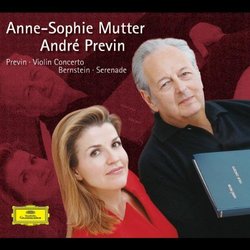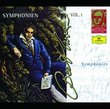| All Artists: Andre Previn, Leonard Bernstein, Boston Symphony Orchestra, London Symphony Orchestra Title: Previn: Violin Concerto; Bernstein: Serenade Members Wishing: 0 Total Copies: 0 Label: Deutsche Grammophon Release Date: 10/14/2003 Genre: Classical Styles: Forms & Genres, Concertos, Historical Periods, Modern, 20th, & 21st Century, Symphonies Number of Discs: 1 SwapaCD Credits: 1 UPC: 028947450023 |
Search - Andre Previn, Leonard Bernstein, Boston Symphony Orchestra :: Previn: Violin Concerto; Bernstein: Serenade
 | Andre Previn, Leonard Bernstein, Boston Symphony Orchestra Previn: Violin Concerto; Bernstein: Serenade Genre: Classical
This record is permeated by love. Bernstein's Serenade was inspired by Plato's Symposium, a series of paeans to love in all its multifarious aspects; Previn's Concerto was inspired by, and composed for, Anne-Sophie Mutter,... more » |
Larger Image |
CD DetailsSynopsis
Amazon.com This record is permeated by love. Bernstein's Serenade was inspired by Plato's Symposium, a series of paeans to love in all its multifarious aspects; Previn's Concerto was inspired by, and composed for, Anne-Sophie Mutter, whom he married shortly afterward. Many distinguished composers, such as Penderecki, Lutoslawski, Currier, and Rihm, have written concertos and other works for Mutter, but surely this one must be especially close and dear to her, and she certainly plays it that way. It is designed to bring out her strengths to best advantage: her stunning virtuosity, her ravishingly beautiful tone, flawlessly pure on all strings, at any tempo, with a glorious radiance in the top register. The part bristles with runs at top speed, double stops, jumps across the whole fingerboard (opening with a leap over about four octaves), and makes full use of her limitless palette of tone-colors. Of the Concerto's three movements, the first and longest is lush, tonal, with broad, soaring melodies and stark contrasts, alternating between fast and slow, lyrical and vigorous sections; the second is more spare, dissonant, mysterious, ominous. The third, and best, is a set of variations on a German children's song, subjecting a simple tune to enormously clever, inventive rhythmic and harmonic distortions and stylistic manipulations. The recurring original melody is played with great affection, revealing its past and present meaning to composer and performer. The orchestration is luscious; the work's style is clearly influenced by Previn's multi-faceted career. As often happens with music written for a specific player, Mutter's performance, recorded live on this disc, will be hard to match. Bernstein, another composer of protean versatility, also draws upon his enormously varied, eclectic stylistic experience in the Serenade. Its four movements loosely resemble a concerto. After a stratospheric violin solo, the first movement turns into a charming, exuberant waltz with a jazzy flavor; the slow second movement is sensuous, graceful, yearning, the third is a brilliant Scherzo, the last is rich, assertive, dissonant, and frankly jazzy. The performance is superb. --Edith Eisler Similarly Requested CDs
|
CD ReviewsHaunting J. Buxton | Waltham, MA United States | 11/25/2003 (5 out of 5 stars) "I really don't enjoy too many modern compositions, but this is an exception. I was present for the live recording of the Previn concerto at Symphony Hall in Boston, and when I listened to the recording it immediately took me back to the impressions I had during the concert. A lyrical, hauntingly beautiful work with several interesting and memorable themes running through it. Mutter was unbelievable live, but this recording really does her justice. It is clear Previn and Mutter's partnership is intimate, as they seem to be absolutely in union throughout the piece. The contributions of the BSO, though somewhat sparse, are captured well. It would not surprise me if this work develops a following, being in a similar vein to the Sibelius concerto, though certainly more modern and less overtly dramatic. The Bernstein is also well worth it, a wonderful companion piece to the Previn." Resourceful derivation by 2 master journeymen minacciosa | Boston, MA | 06/04/2004 (3 out of 5 stars) "Previn's Concerto certainly isn't unpleasant to listen to; it just lacks the individuality of a transcendent composer. The orchestration, the formal layout all are all eerily familiar. One could be unkind and say that this is the Greatest Concerto Korngold Never Wrote, but that would be unfair to Korngold, who was truly one of the Greats. Still, you can't sneeze at this level of craft, and it is awesome. (Three stars for that.) Previn shares that quality with Bernstein, along with Bernstein's unhealthy, undigested and all-consuming eclecticism. Bernstein's Serenade, like virtually all of his compositions excepting West Side Story, Candide (just the Overture!) and On The Waterfront, is highly wrought and completely meretricious. The essential question when listening to any new music is: is there something here that would make me listen to this twice? In both cases, the lukewarm romantic gestures positively scream a negative answer. On the plus side, I'm glad I heard it once. Anne Sophie has become increasingly prone to excessive mannerisms in her playing, but in this music, at least it doesn't get in the way. She can really play the violin, but listening to her makes me want to scream "enough" at the top of my lungs." Wonderful Recordings D. A Wend | Buffalo Grove, IL USA | 03/07/2005 (5 out of 5 stars) "The Previn Violin Concerto is one that proves more rewarding the more one listens to it. Having also heard the music in concert (Andre Previn conducting and Anne-Sophie Mutter performing) this is a concerto that has long melodies, beautiful orchestration and a fabulous part for the soloist. The soloist must be prepared to play for most of the 40 minutes of the concerto, a very demanding work, requiring some very difficult playing. The first movement - marked Moderato - reminded me of Korngold's music somewhat in the lush theme played by the violin. But, make no mistake; Maestro Previn is not imitating anyone. The composer has said that the concerto harkens back to childhood memories and other associations, and clearly the music has is descriptive. The middle movement, Cadenza, has a brooding quality to the music with the soloist interacting with soloists in the orchestra. The final movement Andante ("from a train in Germany") is lyrical with the soloist having some very beautiful passages but also contains some dramatic writing for the orchestra. There are passages of an elegiac nature where the soloist and orchestra seem deep in a melancholy remembrance. The soloist has the last word, ending the concerto with a quietly played passage in the upper register.
The concerto requires a large orchestra with harp, celesta and a large percussion section. This is a concerto that one is impressed with on a first hearing and will reveal more on repeated hearings - a work that Maestro Previn will be high on his list of accomplishments. The disc also contains a superb recording of Leonard Bernstein's Serenade on Plato's Symposium. This work is a concerto in all but name, similar to Lalo's Rhapsody Espanole. The Serenade was written in 1954 on a commission from the Koussevitzky Foundation and was inspired by the composer's reading of Plato's dialogue about the nature or love. The work in is five movements and each relates what one of the members of the dinner has to say about love: Phaedrus, Pausanius, Aristophanes, Erixymachus, Agathon and Socrates and Alcibiades. The first movement is an eloquent lyrical piece representing the speech of Phaedrus in praise of Eros. Aristophanes is a thoughtful Allegretto as he relates the myth of love followed by the playful Presto representing Erixymachus and the deeply felt Adagio representing Agathon. The boisterous finale representing Socrates and the tipsy Alcibiades has a wonderful jazz rhythm, perhaps not every Classicists ideal music) and closes the Serenade on a jubilant note. A first rate performance by Anne-Sophie Mutter and Andre Previn. These are well-recorded performances, beautifully played by the London Symphony. I found the packaging of the CD of note: there are so many pictures of Anne-Sophie Mutter and Andre Previn that I found it odd that there was not a single one of Leonard Bernstein. " |

 Track Listings (8) - Disc #1
Track Listings (8) - Disc #1








